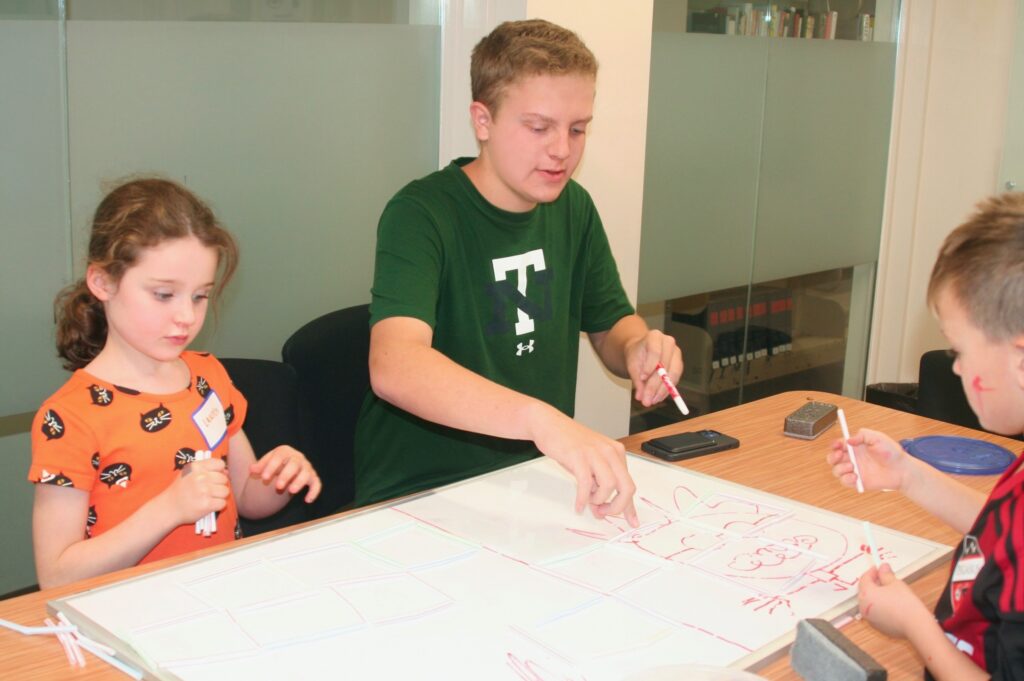Will Glauberman, a junior at New Trier High School just 15 miles north of Chicago, has always loved math. Today, he is sharing his love of math with over 60 students in grades K-6 through a community Math Circle, an out-of-school experience whereby older/more advanced mathematicians guide students’ exploration of math and problem solving… for fun! Will hopes to study applied math in college, and upon graduation join the US Department of Education as the Math Czar in order to transform math education in the United States to be more equitable and achieve better outcomes.
“I have always been a kid who really, really liked math. Ever since I can remember, I loved to play with numbers, finding patterns in every day life. And I was pretty good at it too. Each year, I advanced in my math classes, skipping one and sometimes two grade levels. I participated in advanced enrichment programs and math circles. While I loved the math that I was learning and appreciated always being challenged, it was a little lonely sometimes – I usually wasn’t with my grade-level peers, and sometimes I was even learning alone.
As I have gotten older, I have realized that there are often two very different experiences students have with math – the kind I had where learning keeps getting more and more advanced (and at times competitive), and the experience that so many kids have where they feel like they “hate” math or “aren’t good at math.” There seemed to be little space in between.
Additionally, I have learned that students in the United States are suffering from a deep “math crisis.” The 2022 “Nation’s Report Card” revealed that math scores for 8th graders fell in almost every state, with only 26 percent of 8th grade students proficient in math. These results are even more alarming for low-income and at-risk students. Even though there has been increased federal funding for K-12 schools since the Covid-19 pandemic, it is unclear how these math outcomes will improve.
These phenomena made me think how much better student outcomes and confidence could be if we transformed how students learn math in our schools. Because of this, I was inspired to develop the Glencoe Math Circle (www.glencoemathcircle.com) in my hometown Glencoe, IL. It has been my most meaningful mathematics experience to date. My own experiences with the Stanford Math Circle, the Midwest Math Circle and others transformed my view of how students should experience mathematics and motivated me to share my love of mathematics with others in a collaborative and engaging way, without grades, tracking or competition. When I first surveyed my community about the possibility of creating a Glencoe Math Circle, I was surprised to find that over 80 families expressed interest! It was clear that parents and children were looking for new ways to experience mathematics that did not necessarily involve grades or competition. After three months of extensive work planning, marketing, and developing curriculum (with a lot of guidance from Dr. Jo Boaler’s work at Stanford University), I taught my first classes this past Fall to children ranging from kindergarten to sixth grade. I still love conquering difficult math tests and tackling complicated proofs in math competitions, but now I have found equal meaning in guiding young children in their own collaborative mathematics journey.
Beyond my immediate goal of studying math/applied math in college, I hope to someday work to transform how math is taught in the United States, to address these issues of lagging test scores equity, and interest in math education. I believe that our country needs both excellent math scholars and educators to collectively work toward solutions for these issues. I hope to be an integral part of that process, and I hope others will join me along the way.”
